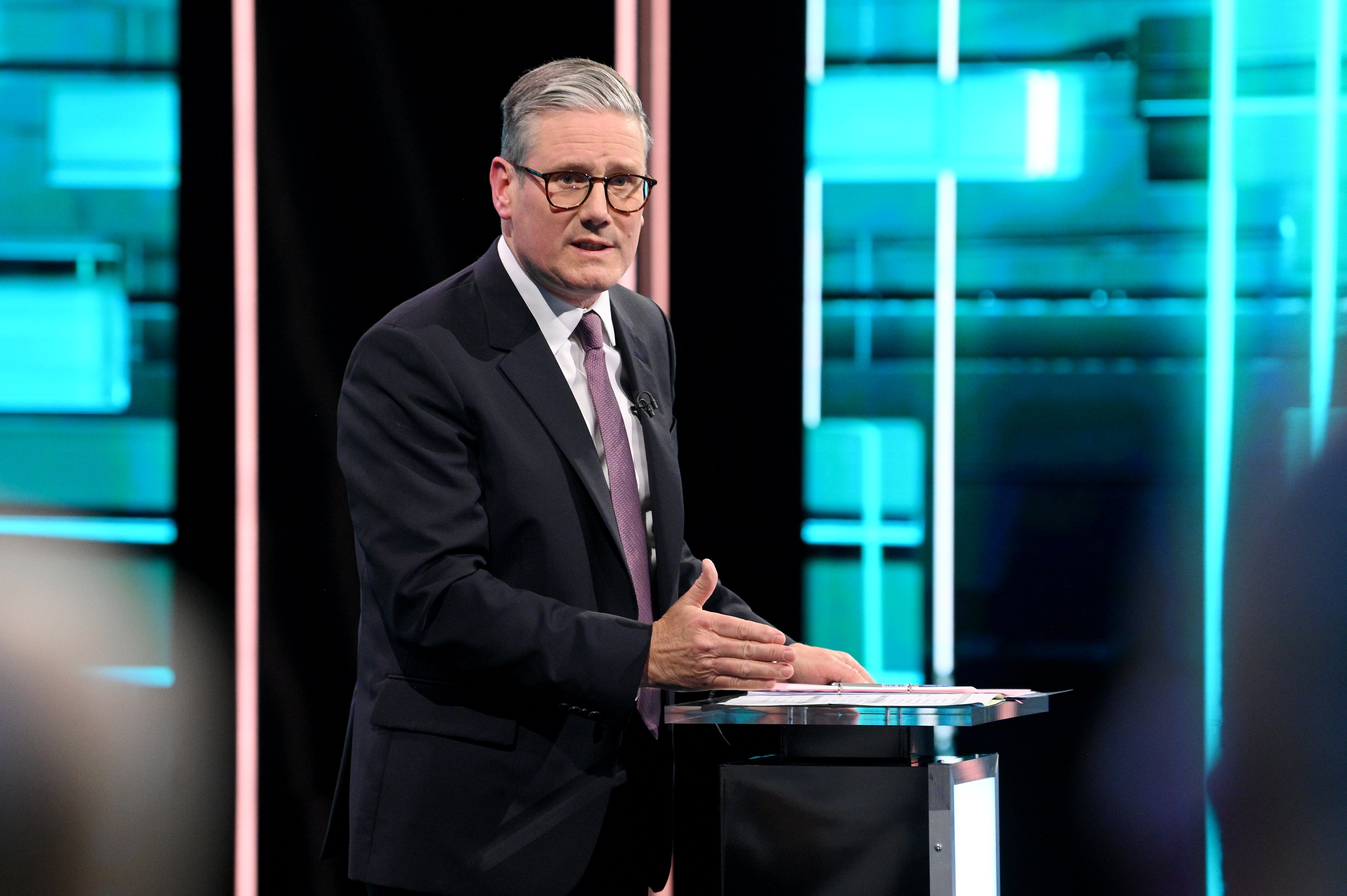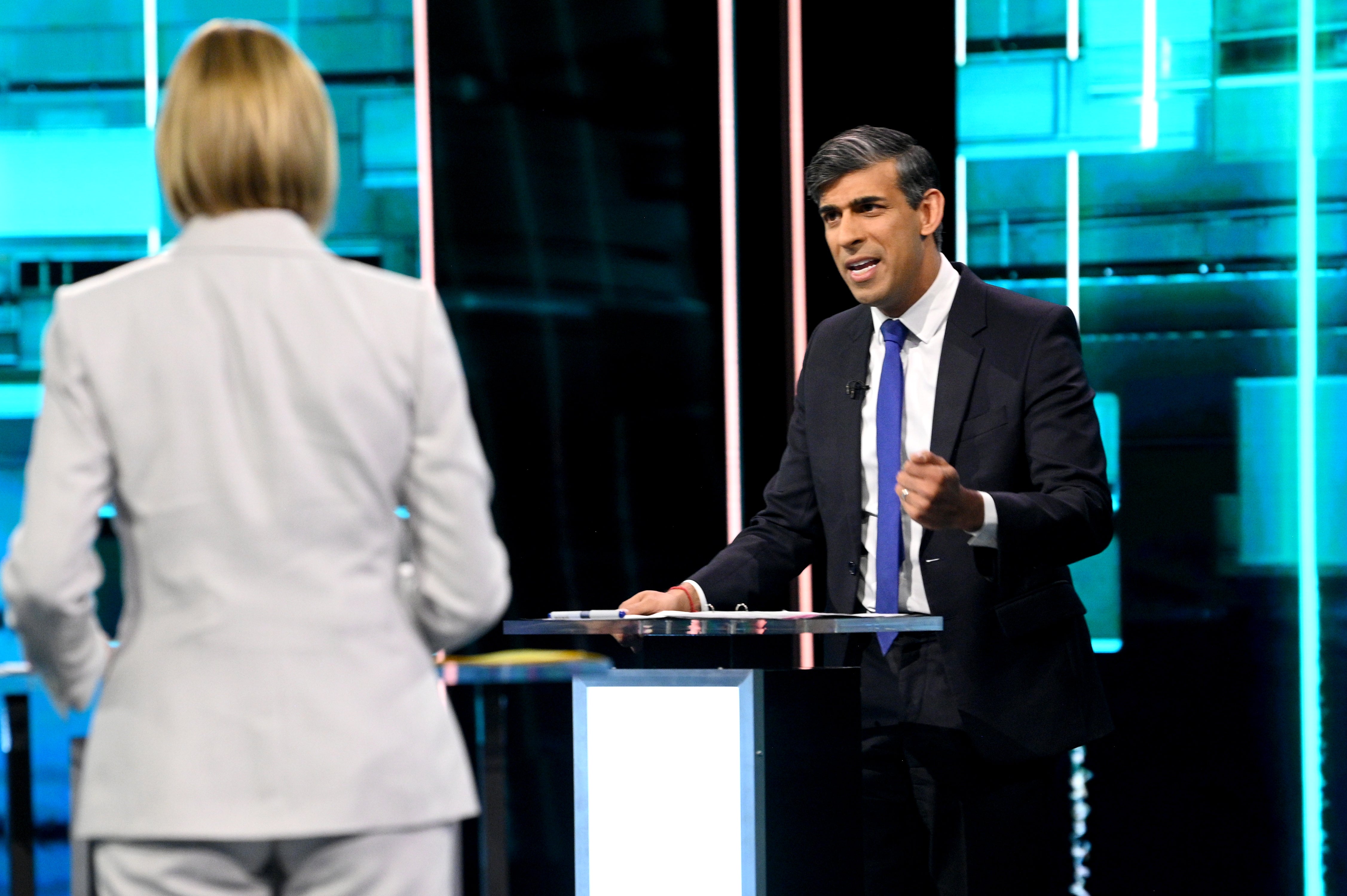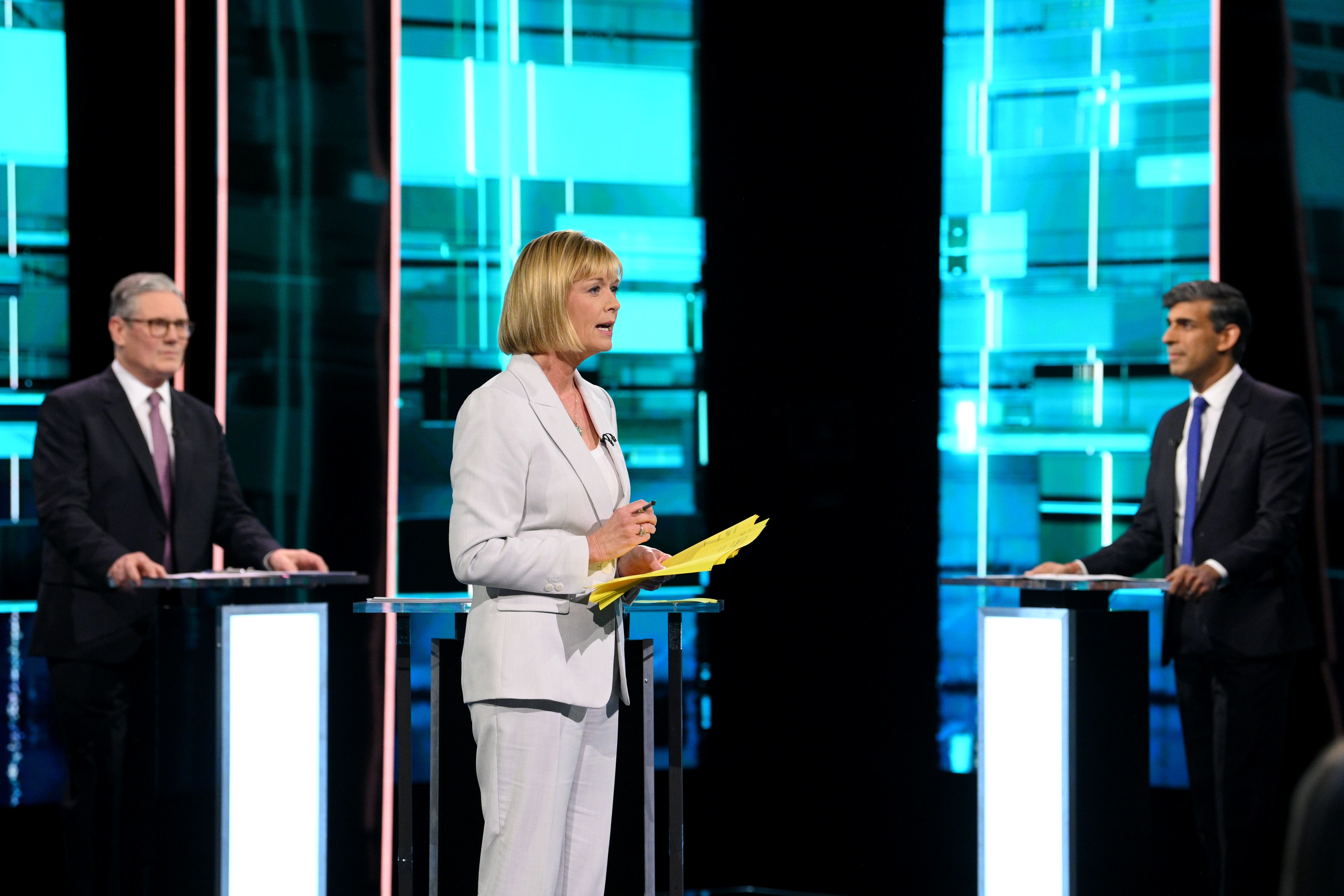Gentlemen please! Sunak claims narrow win over Starmer in tetchy first general election TV debate
Rishi Sunak and Keir Starmer came out of their first contest evenly matched in the testy first leaders’ debate of the general election
Your support helps us to tell the story
From reproductive rights to climate change to Big Tech, The Independent is on the ground when the story is developing. Whether it's investigating the financials of Elon Musk's pro-Trump PAC or producing our latest documentary, 'The A Word', which shines a light on the American women fighting for reproductive rights, we know how important it is to parse out the facts from the messaging.
At such a critical moment in US history, we need reporters on the ground. Your donation allows us to keep sending journalists to speak to both sides of the story.
The Independent is trusted by Americans across the entire political spectrum. And unlike many other quality news outlets, we choose not to lock Americans out of our reporting and analysis with paywalls. We believe quality journalism should be available to everyone, paid for by those who can afford it.
Your support makes all the difference.Rishi Sunak and Sir Keir Starmer slugged it out in a tetchy first leader’s debate of the general election, with snap pollsters giving a narrow edge to the embattled prime minister.
While Mr Sunak appeared to land more verbal blows on the Labour leader, he was also mocked more by an audience concerned about the state of the NHS, schools, and the cost of living.
In a shouty confrontation, ITV’s Julie Etchingham struggled at times to keep the debate civil, and had to issue a half-time warning to the two men to stop interrupting one another.
In the second half of the debate, during a particularly loud exchange, she said: “Please, gentlemen, we will lower our voices.”

With Labour leading in the polls by more than 20 points, and the Tories – according to some predictions – facing the prospect of winning fewer than 100 seats, Mr Sunak was under huge pressure to score a significant victory.
And while the YouGov instant reaction poll gave him a narrow win of 51 per cent to 49 per cent, the closeness of the survey underscored a contest in which it was difficult to see a clear winner.
But the prime minister will be pleased that his two attack lines appeared to gain traction.
Damagingly, it took Sir Keir 26 minutes to deny Mr Sunak’s repeated claim that he would raise taxes by more than £2,000 for each household. He eventually retorted that the figure had come from the Tories “taking a made-up Labour policy to Treasury officials for them to cost”.

Mr Sunak also wanted to underscore his claim that Labour has no plan, saying that this election is “about the future and not the past” while insisting he has a plan himself.
He repeatedly demanded to be told what Sir Keir would do about a number of issues, including doctors’ strikes and illegal immigration, and was met with criticism of his own record from Sir Keir.
But the Labour leader appeared to show more empathy with the audience, starting with a question about the cost of living from a woman who described bulk cooking at weekends to save money on energy bills.
Sir Keir appeared to deploy tactics used in 2010 by Nick Clegg, of addressing audience members by name and looking straight into the camera.
As the debate wore on, Sir Keir began to dismiss Mr Sunak’s attacks as “childish” and “garbage” while remarking that the prime minister was becoming increasingly “desperate”.

As the two locked horns on tax, Sir Keir said Mr Sunak had raised tax 25 times, saying: “He is the British expert on tax rises. They are at the highest level for 70 years.” But Mr Sunak hit back, saying the election was “about the future” and insisting that he would keep cutting taxes while Labour would raise them.
However, the worst moment came when Sir Keir mocked Mr Sunak over waiting lists being longer than when he had promised to bring them down. Mr Sunak insisted that they were coming down, saying that they were “lower than they had been”, which prompted laughter from the audience.
Asked how long it would take to fix the “broken” health service, the prime minister pointed to the damage done by the Covid-19 pandemic, acknowledging that it would take time to recover, and adding: “But we are now making progress: waiting lists are coming down.”
There was laughter when the Labour leader countered: “They were 7.2 million, they’re now 7.5 million. He says they are coming down, and this is the guy who says he’s good at maths.”
Mr Sunak then blamed industrial action, eliciting groans from the audience watching the debate. “It’s somebody else’s fault,” Sir Keir said.
While earlier in the day Nigel Farage had mocked the two men for being the same, differences emerged during the course of the debate.
Both men were asked directly whether they would use private healthcare if a family member was on a long waiting list for NHS care, and both gave clear answers.
Mr Sunak said he would, while Sir Keir said he would not.
The Labour leader added: “I don’t use private health. I use the NHS. That’s where my wife works, in one of the big hospitals; as I said, it runs through my DNA.”
Crucially, Mr Sunak attacked Sir Keir over plans to pay for 6,500 extra teachers by ending the charitable status of independent schools and adding 20 per cent VAT to their fees.
But Ms Etchingham also exposed the similarity of their positions when she pointed out that both had promised not to raise income tax VAT or national insurance.
Mr Sunak did not resile from his allegation that the country would be unsafe with Labour in charge, pointing to Angela Rayner’s past support for scrapping the Trident nuclear deterrent.
Responding to a question on security, Sir Keir pointed to his experience as director of public prosecutions as evidence that he could be trusted to keep Britain safe. But he also sought to draw a contrast between himself and Mr Sunak, saying the prime minister had made millions of pounds “betting against the UK during the financial crisis”.
Mr Sunak responded that he would “rather have my job than work for Abu Qatada”, referring to Sir Keir’s work as a human rights lawyer when he represented the controversial preacher in his fight against deportation.
The Labour leader also doubled down on his claim that national service for school leavers was “Dad’s Army for teenagers”. The prime minister sought to defend his policy, saying it would be “transformational for young people in our country, giving them the skills and opportunity they need to succeed in life”.
But again his response drew laughter from the studio audience.
Michael Gove was inside the spin room after the debate to tell gathered journalists it was a six nil win for Mr Sunak.
The retiring senior minister told journalists after the contest that even failed former Labour leader Ed Miliband would have done better than Sir Keir Starmer.
And he said Sir Keir’s performance has left the Labour Party “in confusion, disarray and despondency”. “They wanted to walk this general election, but Keir Starmer has fallen flat on his face,” Mr Gove added.
Asked whether the Tories were in disarray because of Nigel Farage’s decision to run in the general election, Mr Gove said: “Reform are just an arm of the Labour Party.”
Labour’s spin team for the night of Jonathan Ashworth and Pat McFadden were quick out the gates to claim the “choice after the debate is the same as before”.
The pair defended Keir’s slow response to Mr Sunak’s tax barbs and pointing out the tax burden is at a 70-year high.
Mr McFadden insisted: “We are the challengers in this election. The Tories are the incumbents. You don’t need to make allegations… look at the tax levels right now… they are the highest they have been for 70 years and that’s under their watch.”
And a beaming Mr Ashworth said: “What is absolutely clear is that Rishi Sunak’s sums simply do not add up. As we pointed out… he has made £71bn worth of commitments in this campaign out of desperation.”

Join our commenting forum
Join thought-provoking conversations, follow other Independent readers and see their replies
Comments